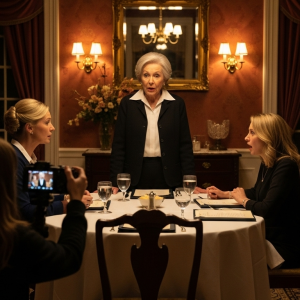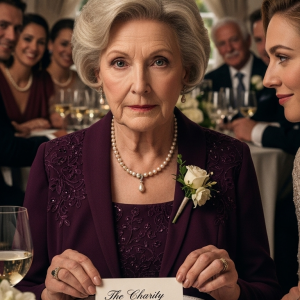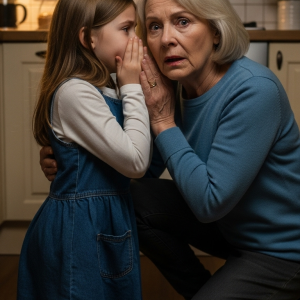During Thanksgiving dinner, my daughter stood up and announced, “We’ve decided to cut you out of this family.” I laughed, then gave her an envelope. “Here’s something for all of you.” When they opened it and saw what I’d done, they knew their comfortable lives were over.
I’m Margaret Wilson—Maggie to most. At 68, I never thought I’d be telling this story, but here we are. Trust me, it’s worth your time. That Thanksgiving dinner happened three weeks ago. But to understand it, I need to take you back six months, to the day my world fell apart.
It started with Harold’s funeral. My husband of forty-five years died of a sudden heart attack while tending his beloved roses. One minute he was here; the next, he was gone. The roses kept blooming, but everything else stopped.
My daughter, Susan, and her husband, David, were wonderful at first. They handled the details I couldn’t manage, hosted relatives, and made sure I ate. For a few days, we felt like a real family.
A week after we buried Harold, Susan sat at my kitchen table. “Mom, you can’t stay in this big house alone,” she said, her voice laced with concern. “It’s not safe, and honestly, it’s not practical.”
I looked around the kitchen Harold and I had renovated, the place we’d shared coffee every morning for a decade. “This is my home, Susan.”
“We found a lovely senior community,” David added. “Independent living, people your own age.” As if I’d suddenly become ancient instead of simply widowed. But they wore me down, as loving children do when they think they know best.
So, I sold the house. Our house. The place where Susan took her first steps and where Harold and I had slow-danced on our 25th anniversary. I sold it and moved into a two-bedroom apartment in a complex that smelled of industrial carpet cleaner. It wasn’t a home; it was a beige, soulless box.
“We’ll store your dining hutch in our basement,” David offered. “You can visit it whenever you want.” Visit my own china, as if it were in prison. The first month was the hardest, waking up and reaching for a man who wasn’t there, in a home that wasn’t mine. But I am not the type to wallow.
That’s when Susan’s “financial difficulties” began. A phone call on a Tuesday. “Mom, I hate to ask, but David’s commission check was delayed. Could you possibly help with the mortgage?”
Of course, I could. What was I saving for? I had the life insurance payout, the proceeds from the house sale, and Harold’s pension. I transferred the $3,200 that night.
The payback never happened. There was always something. The car needed repairs. My granddaughter, Emily, needed money for school activities. My grandson, Ryan, needed orthodontics. By November, I had given them over $35,000. I didn’t mind. Family helps family.
I discovered the truth entirely by accident. Emily, my sixteen-year-old granddaughter, had left her Instagram open on my iPad. I was just closing the app when I saw David’s latest post: a picture of him and Susan at an upscale restaurant, raising champagne glasses.
The caption read: “Celebrating another successful quarter! When you work hard, you reward yourself. #Blessed #LivingOurBestLife.”
A successful quarter? Just two weeks earlier, Susan had cried on the phone about not being able to afford Emily’s college application fees. I scrolled through more posts, my coffee growing cold as the truth unfolded in perfectly filtered photographs. A weekend getaway to a luxury spa to “recover from financial stress.” A new BMW. All posted while I was writing checks for their mortgage.
That night, I couldn’t sleep. I thought of Harold working double shifts for years so we could pay off our house. I thought of us saving every penny for a retirement he never got to enjoy.
The next morning, I called Susan, keeping my voice light. “Hi honey, how are things?”
“Oh, you know, same old struggles,” she sighed. “David’s commission check is late again, and we’re behind on Emily’s car insurance. I hate to ask, but could you manage $800?”
The lie came so easily. “Of course,” I said. “I’ll transfer it this afternoon.” But I didn’t. Instead, I made an appointment with James Patterson, the estate attorney who’d handled Harold’s will.
“Mrs. Wilson,” James said after I told him everything, his kind eyes now steely. “In legal terms, what you’re experiencing is called elder financial abuse. They are exploiting your generosity to fund their lifestyle.”
“They’re my family,” I whispered.
“Family helps in times of genuine need,” he countered, “not to pay for luxury vacations while lying about hardship. You’ve given them nearly $40,000 in four months. That’s not help. That’s being taken advantage of.”
The words stung because they were true. We spent the next hour building what he called “financial firewalls.” New bank accounts they couldn’t access. A review of all my assets. Documentation of their deception.
The phone call that solidified my resolve came a few weeks later. Susan was crying. “Mom, I need to tell you something. We’ve been having problems… we’re in danger of losing the house.”
The beautiful colonial with the perfect landscaping. The house I’d been paying the mortgage on for months.
“How far behind are you, Susan?”
“Six months, maybe seven. We need about $25,000 to catch up. If we lose the house, where will the kids go? We can’t uproot Emily in her junior year!”
Twenty-five thousand dollars. On top of the nearly forty thousand I’d already given them. I told her I’d call her back. That night, I cried until I couldn’t cry anymore. Then I called James Patterson.
“What happens if I say yes?” I asked him.
“You’ll be out $65,000 with no guarantee they won’t be in the same situation six months from now. You’ll be enabling a pattern of irresponsibility that will only get worse.”
The final insult, the one that pushed me over the edge, came from my granddaughter Emily. She called me, bypassing her parents. “Grandma, Mom told me you can’t afford to help with my college applications because you’re on a fixed income. But then I saw Dad’s new golf clubs. I looked them up online. They cost $3,000.”
That’s when I knew I was done being the family ATM. I was done being their silver lining. I was about to become their storm.
Thanksgiving Day arrived, gray and cold. I arrived at Susan’s house carrying my famous sweet potato soufflé and a manila envelope that would change everything. The envelope contained copies of every bank transfer, every incriminating Instagram post, and a report from a private investigator I had hired.
Susan greeted me with an unusually enthusiastic hug. David poured me a glass of wine. The compliments flowed. Dinner was pleasant, normal, and entirely fake. After dessert, they exchanged a glance. Showtime.
“Mom,” Susan began, “we need to talk about the house.”
“Of course,” I said, folding my napkin.
“We know it’s an enormous amount of money,” David leaned forward earnestly. “But this is our last chance. We were hoping…”
“You were hoping I’d give you $25,000,” I finished for him.
I reached into my purse and pulled out the manila envelope. “Actually, I have something for you.” Susan opened it and pulled out the stack of bank statements. I watched her face as she realized what she was looking at.
“What is this?”
“Documentation of every lie you’ve told me for the past four months,” I said calmly. The color drained from David’s face.
“Mom, you’re taking this out of context,” Susan stammered, her hands shaking.
“Really? What context makes it acceptable to lie to your widowed mother about needing mortgage payments when you’re actually seven months behind and spending her money on $3,000 golf clubs?”
Emily looked at her parents with growing horror. “Is this true?”
“It’s complicated, sweetheart,” David said.
“No, it’s not,” I said, standing up. “It’s fraud. And it stops now.”
That’s when Susan played her final card, her voice filled with venom. “We’ve decided to cut you out of this family.”
The words hung in the air. Emily gasped. David looked like he wanted to disappear. And I… I laughed. Genuine, unrestrained amusement. After months of manipulation, she thought she could threaten me with abandonment to get what she wanted.
“Well,” I said, reaching back into the envelope. “In that case, you’ll definitely want to see the rest of this.” I pulled out the private investigator’s report and placed it on the table. “It documents every expensive purchase you’ve made with my money, cross-referenced with your social media and credit card statements. I also filed a complaint with the state Attorney General’s office for elder financial abuse.”
Susan’s composure completely shattered. “You can’t do this to us! We’re your family!”
“Family doesn’t steal from each other, Susan. But since I’m apparently no longer part of this family, I suppose that makes you common criminals instead of ungrateful relatives.” I picked up my purse and coat, then turned back one final time. “Oh, and Susan? Happy Thanksgiving.”
The next morning, the calls started. First Susan, crying. Then David, pleading. Then Susan again, with threats. I responded to none of them. My lawyer, James, called that afternoon. “They’d like to discuss a settlement,” he said.
“What kind of settlement?”
“Full restitution. They want you to drop the criminal complaint. And in return, they’ll agree to have no further contact with you.”
I had to laugh. “They think ‘no contact’ is something I’d pay for. James, at this point, self-respect is more important to me than family relationships or money. We proceed.”
That evening, my son Michael called from Denver. I told him everything. He was quiet for a long moment. “That’s really screwed up, Mom. I’m sorry. You’re not angry?”
“Angry? Mom, I’m proud of you.” I started crying then, with relief. “Patricia and I want you to come visit for Christmas. Stay as long as you want.”
The settlement conference was a week later. I offered them a deal: full restitution of the $37,800, a written apology, and six months of financial counseling. In return, I would agree not to pursue criminal charges. The civil complaint would remain active until the debt was paid.
“And we can rebuild our relationship?” Susan asked hopefully.
“No, Susan,” I said. “That ship sailed when you decided to cut me out of the family. This is purely a business transaction now.”
Six months later, I’m writing this from my new apartment in Denver, three blocks from Michael’s house. The view is of the Rocky Mountains, not a parking lot. Susan and David are making their monthly payments. They lost their house anyway; it turned out the $25,000 wouldn’t have been enough to save it.
Emily wrote to me last month. She’s been accepted to three colleges. She thanked me for refusing to enable her parents, saying she was learning to appreciate earning things. She also mentioned that David was attending Gamblers Anonymous. The commission delays had been lies to cover sports betting losses.
I felt sad reading that, but not guilty. Sometimes the most loving thing you can do for someone is to refuse to help them destroy themselves. Susan hasn’t contacted me, but she sends updates through Michael. They’re both working, living within their means, and slowly rebuilding.
As for me, I’m finally living the life Harold and I dreamed of. I still miss him every day, but I no longer feel guilty about being happy without him. And I will never, ever feel guilty about protecting myself from people who would take advantage of my love—especially if those people are family.
Six months later, I’m writing this from my new apartment in Denver, three blocks from Michael and Patricia’s house. The view from my living room window shows the Rocky Mountains instead of a parking lot, and my kitchen is big enough for the dining set that had been stored in Susan’s basement.
The settlement was signed. Susan and David are making payments of $800 per month, a cold, electronic reminder that arrives in my account on the first of every month. It will take them just over four years to complete the restitution. They lost their house anyway; the $25,000 I refused to give them wouldn’t have been enough to save it.
My son Michael’s family has welcomed me with a warmth I’d forgotten was possible. I have my own space but see my grandsons several times a week. I’m teaching ten-year-old Marcus to bake Harold’s famous cookies, and eight-year-old Luke has decided I give the best hugs in Colorado. I joined a book club, started volunteering, and even tried skiing. At 69, I was finally living the life Harold and I had dreamed of.
I still miss him every day, but I no longer feel guilty about being happy without him. And I never, ever feel guilty about protecting myself from people who would take advantage of my love—especially if those people are family.
Life settled into a peaceful, predictable rhythm. The monthly check from Susan was the only ghost from my past life, a transaction devoid of emotion. I thought this was how it would be forever—a clean break, a business arrangement, a quiet ending to a painful chapter. I was wrong.
The phone call that changed things again came not from Susan, but from Emily. It was a Tuesday in April, almost a year after the disastrous Thanksgiving.
“Grandma?” Her voice was hesitant, older than it had sounded in her letters. “I’m coming to Denver next month to tour the university campus.”
My heart swelled. “Emily, that’s wonderful! You’ll stay with me, of course. We can go out for a celebratory dinner.”
“That would be great,” she said, and then she paused. I could hear her take a deep breath on the other end of the line. “Grandma… I was wondering… if it would be okay if Mom came with me.”
The peaceful world I had so carefully constructed suddenly felt fragile. Susan. Here, in Denver. The thought of seeing her face-to-face, of making small talk after the accusations and the lawsuits, was exhausting. My first instinct was a sharp, definitive “no.”
“I know it’s a lot to ask,” Emily rushed on, sensing my hesitation. “But she’s… different now. She’s been working really hard. And she misses you. She just doesn’t know how to say it.”
I looked out my window at the mountains, their peaks solid and unshakeable. I had fought for my peace, for my right to live without drama and manipulation. Was I supposed to give that up now? But then I thought of Emily, this bright, wonderful girl caught in the wreckage of her parents’ choices, bravely trying to rebuild a bridge.
“Let me think about it, sweetheart,” I said, my voice softer than I felt. “I’ll call you back tomorrow.”
I immediately called Michael. I laid out the situation, expecting him to be as protective of my new life as I was.
“What did you tell her?” he asked.
“I told her I’d think about it. But Michael, I don’t know if I can do it. I don’t know if I can sit across from her and pretend everything is okay.”
He was quiet for a moment. “Mom, you don’t owe her anything. Not a thing. If you say no, you are completely justified.” He paused. “But… what if Emily is right? What if she has changed? You won’t know unless you see her. Maybe this isn’t for Susan’s sake. Maybe it’s for Emily’s.”
He was right, of course. My battle had never been with my grandchildren. My decision to cut Susan and David off was, in part, to protect Emily and Ryan from their parents’ destructive patterns. What kind of lesson would I be teaching them if I refused to even consider the possibility of growth and change?
I called Emily back the next morning. “Your mother can come to Denver,” I said, setting the terms clearly. “But this trip is about you. She will stay in a hotel. You will stay here with me. We can all have coffee together near the campus on Saturday.”
It wasn’t a family reunion. It was an armistice. A carefully negotiated meeting on neutral ground.
I saw her before she saw me. She was standing outside the campus coffee shop, looking smaller than I remembered. The designer clothes were gone, replaced by simple jeans and a practical coat. Her hair wasn’t perfectly styled, and she wore little makeup. She looked… tired. But not in the frantic, stressed way I remembered. This was the quiet exhaustion of someone who had been working hard, not just at a job, but on herself.
When Emily spotted me and waved, Susan turned. For a moment, her eyes met mine, and I saw a flicker of the old fear. Then it was replaced by a look of profound, humbling sadness.
The conversation at first was stilted, focused entirely on Emily. We talked about the campus, the dorms, the application process. I was polite but distant. Susan was quiet, respectful, answering only when I asked her a direct question. She didn’t try to fill the silence or force a connection that wasn’t there.
The moment came when Emily went to the counter to get a refill. We were alone.
“Margaret,” Susan began, her voice barely a whisper. She didn’t call me “Mom.” “I know ‘sorry’ isn’t enough. I know it will never be enough.”
I simply nodded, waiting.
“I’ve been in counseling for almost a year now,” she continued, staring down at her coffee cup. “And so has David. His gambling… it was a sickness. And my spending… that was a sickness, too. I was so afraid of failing, of not having the perfect life everyone thought we had. It felt easier to lie and take from you than to admit to everyone, and to myself, that I was drowning.”
I listened, not with sympathy, but with a kind of clinical detachment. I understood the psychology of it, but understanding didn’t erase the betrayal.
“I understand the fear, Susan,” I said, my voice even. “I don’t understand the cruelty. You didn’t just ask for money. You lied, repeatedly. You used your own daughter to manipulate me. You planned to put me in a home and strip me of my autonomy.”
Tears welled in her eyes, but she didn’t let them fall. She just nodded, accepting my words as her due. “I know. And I will spend the rest of my life trying to earn back a fraction of your trust. Not for me,” she finally looked up at me. “For Emily. She needs her grandmother. She needs to see that families, even broken ones, can find a way to heal.”
Emily returned then, saving me from having to respond. The rest of our coffee meeting passed in a blur of small talk. But the tension had shifted. It was no longer hostile; it was somber, heavy with the weight of everything that had been said and done.
As they got up to leave, I stopped them. “The restitution payments will continue,” I said, making it clear that this was not a full pardon. “That is a financial debt that must be paid.” I looked at Susan. “But the other debt… the relationship… perhaps that can be rebuilt. Slowly.”
I turned to my granddaughter. “Emily, I want you to call me every Sunday. I want to hear all about your college plans.” Then, I looked back at Susan. “You can be on the calls. We’ll talk about the children. And we will see where it goes from there.”
Susan’s face crumpled with a relief so profound it was painful to watch. She simply whispered, “Thank you.”
I watched them walk away, my daughter and my granddaughter, two women navigating a future that I had irrevocably changed. I didn’t feel the triumph of victory anymore. I felt something far more complex: the heavy, difficult, but ultimately more satisfying burden of a fragile peace. I hadn’t forgotten or even fully forgiven the betrayal. But I had chosen to stop being a prisoner of the past. I had chosen to invest in the future. And for the first time, it felt like a future the entire family, in some new, broken-but-mending form, might one day share.




